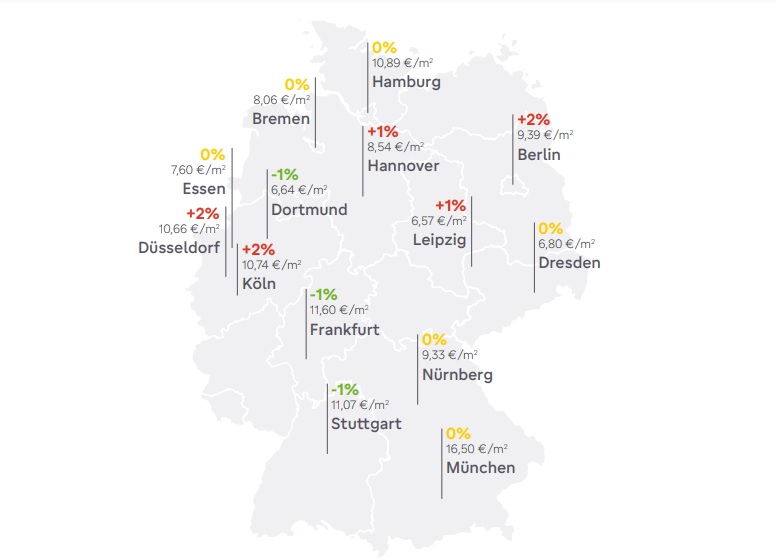Thessaloniki gets ready for its metro launch in November
The underground rapid transit lines have been under construction for almost two decades due to various project delays
 TheMayor.EU logo
TheMayor.EU logo According to the researchers, prices have reached their peak, as tenants simply cannot afford to pay more
On Monday, a new study published by Immowelt found that rent prices across Germany have stagnated over the summer and, in some major cities, have even declined. The study focused on 14 cities, among which Frankfurt, Munich, Berlin, Cologne, Dresden, Stuttgart, Hamburg and Leipzig.
The study was created by measuring the price per square metre in an 80-m2 apartment that has three rooms and is on the second floor.
According to the authors, a possible cause of the recent development is the fact that prices have reached their peak and Germans simply cannot afford to pay more. This is especially true for the most expensive cities on the list: Frankfurt and Munich.
Meanwhile, Berlin made a notable exception, as prices continued to go up after the rent cap was ruled unconstitutional in April this year.
Only five out of the 14 cities measured a rent increase compared to eight out of 14 in the same study from last year. According to the researchers, this would suggest that the overall curve of rent is flattening out. Six cities have shown price stagnation and a further three have shown a slight drop.
Munich is the most expensive city in Germany, especially when it comes to housing, however, the research showed that prices there have stagnated at 16.50 euros per square metre since the start of 2021. Frankfurt, the second most expensive city in Germany, on the other hand, exhibited a slight price drop of 1% from its measured rent price of 11.60 euros.
The same can be said for Stuttgart, as rents have fallen by 1% every three months for the past year and a half. Currently, the price is reported to be 11.07 per square metre. In Hamburg, another one of the most expensive cities in the country, prices have also stagnated at 10.89 euros.
 A map of rent in Germany, Source: Immowelt website
A map of rent in Germany, Source: Immowelt website
Local authorities in Berlin tried to manage the rising rents in the city by instituting a rent cap, however, the court ruled that the move was unconstitutional in April. According to the experts in Immowelt, the repeal of the rent cap sparked a catch-up effect, where the prices started going up disproportionately to wages.
The asking price for a square metre in the city climbed by 2% over the spring and a further 2% over the summer. According to the data, the current price per square metre in the capital is 9.39, compared to 9.06 at the start of the year.
The housing situation in Berlin has been extremely polarised over the past year. In the recent local election, citizens voted ‘yes’ on the accompanying referendum calling for the nationalisation of properties from the biggest landlords.
However, the move could turn out to be unconstitutional. Furthermore, it needs to actually pass in the city’s parliament, as the referendum is non-binding. Franziska Giffey, the Social Democratic Party (SPD) candidate who won the most votes in the mayoral election has stated that she does not plan to do anything resembling nationalisation.
Meanwhile, the two largest real estate companies in Germany are trying to negotiate a merger, that would create the largest landlord in the European Union, owning about 550,000 individual properties.

The underground rapid transit lines have been under construction for almost two decades due to various project delays

Now you can get your wine in Talence by paying directly in Bitcoin

That’s because the state has to spend money on updating the railway infrastructure rather than subsidizing the cost of the popular pass

Rethinking renewable energy sources for the urban landscape

The examples, compiled by Beyond Fossil Fuels, can inform and inspire communities and entrepreneurs that still feel trepidation at the prospect of energy transition

Now you can get your wine in Talence by paying directly in Bitcoin

The 10th European Conference on Sustainable Cities and Towns (ESCT) sets the stage for stronger cooperation between the EU, national and local level to fast track Europe's transition to climate neutrality.

At least, that’s the promise made by the mayor of Paris, Anne Hidalgo

The underground rapid transit lines have been under construction for almost two decades due to various project delays

At least, that’s the promise made by the mayor of Paris, Anne Hidalgo

Hostal de Pinós is located in the geographical centre of the autonomous region

Despite its church-y name, the district has long been known as the hangout spot for the artsy crowds

Urban dwellers across the EU are having a say in making their surroundings friendlier to people and the environment.

Forests in the EU can help green the European construction industry and bolster a continent-wide push for architectural improvements.

Apply by 10 November and do your part for the transformation of European public spaces

An interview with the Mayor of a Polish city that seeks to reinvent itself

An interview with the newly elected ICLEI President and Mayor of Malmö

A conversation with the Mayor of Lisbon about the spirit and dimensions of innovation present in the Portuguese capital














